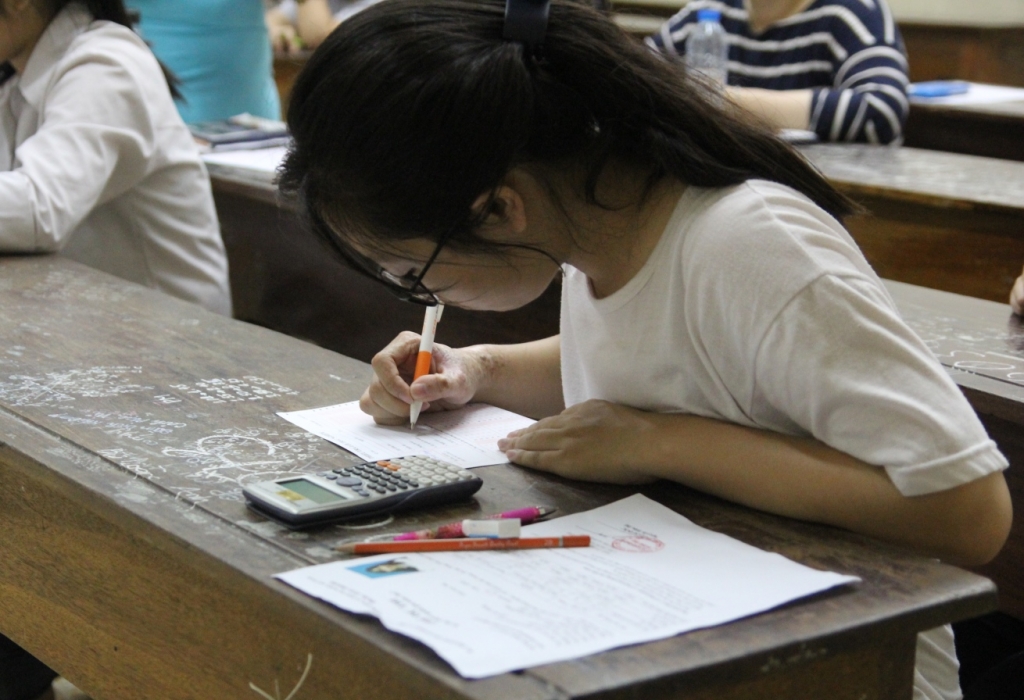Unit 3: Teen stress and pressure
- Vocabulary:
adolescence (n) /ˌædəˈlesns/: giai đoạn vị thành niên
ex: Adolescence brings about major changes in a young person’s body.
adulthood (n) /ˈædʌlthʊd/: giai đoạn trưởng thành
calm (adj) /kɑːm/: bình tĩnh
cognitive skill /ˈkɒɡnətɪv skɪl/: kĩ năng tư duy
concentrate (v) /kɒnsntreɪt/: tập trung
ex: We need to concentrate resources on the most run-down areas.
confident (adj) /ˈkɒnfɪdənt/: tự tin
ex: The team feels confident of winning.
delighted (adj) /dɪˈlaɪtɪd/: vui sướng
ex: I was delighted with my presents.
depressed (adj) /dɪˈprest/: tuyệt vọng
ex: She felt very depressed about the future.
embarrassed (adj) /ɪmˈbærəst/: xấu hổ
ex: I've never felt so embarrassed in my life!
emergency (n) /iˈmɜːdʒənsi/: tình huống khẩn cấp
frustrated (adj) /frʌˈstreɪtɪd/: bực bội (vì không giải quyết được việc gì)
ex: It's very easy to get frustrated in this job.
helpline (n) /ˈhelplaɪn/: đường dây nóng trợ giup
house-keeping skill /haʊs-ˈkiːpɪŋ skɪl/: kĩ năng làm việc nhà
independence (n) /ˌɪndɪˈpendəns/: sự độc lập, tự lập
informed decision (n) /ɪnˈfɔːmd dɪˈsɪʒn/: quyết định có cân nhắc
left out (adj) /left aʊt/: cảm thấy bị bỏ rơi, bị cô lập
life skill /laɪf skɪl/: kĩ năng sống
relaxed (adj) /rɪˈlækst/: thoải mái, thư giãn
ex: I’m feeling more relaxed about the future now.
resolve conflict (v) /rɪˈzɒlv ˈkɒnflɪkt/: giải quyết xung đột
risk taking (n) /rɪsk teɪkɪŋ/: liều lĩnh
self-aware (adj) /self-əˈweə(r)/: tự nhận thức, ngộ ra
ex: She was sufficiently self-aware to recognize the cause of her problems.
self-disciplined (adj) /self-ˈdɪsəplɪnd/: tự rèn luyện
stressed (adj) /strest/: căng thẳng, mệt mỏi
ex: He was feeling very stressed and tired.
tense (adj) /tens/: căng thẳng
ex: She sounded tense and angry.
worried (adj) /ˈwɜːrid/: lo lắng
ex: She gave me a worried look.
- Collocation:
-concentrate something + adv./prep.
+ concentrate (on something/on doing something)
+ concentrate something
- confident of something/doing something
- delighted to do something
- delighted by/at something
-delighted with something
- embarrassed to do something
- embarrassed about/at something
- relaxed (about something)
- worried about somebody/something
- Grammar:
*Câu tường thuật:
say + (that) + S + V
say + to + O + (that) + S + V
tell + O + (that) + S + V
Biến đổi động từ theo cách sau (lùi một thì):
-Present simple - Past simple
-Present continuous - Past continuous
-Present perfect - Past perfect
-Past simple - Past perfect
-Present perfect continuous - Past perfect continuous
-Past continuous - Past perfect continuous
-will - would
-can - could
-must/ have to - had to
-may - might
Chú ý: Các trường hợp sau không thay đổi thì của động từ khi chuyển từ câu trực tiếp sang câu tường thuật
- Động từ giới thiệu ở các thì hiện tại đơn, hiện tại tiếp diễn, hiện tại hoàn thành hoặc tương lai đơn
- Khi lời nói trực tiếp diễn tả một sự thật hiển nhiên, một chân lý; là câu điều kiện không có thật ở hiện tại (loại 2) hoặc quá khứ (loại 3); hoặc là câu điều ước (wish)
*Câu hỏi tường thuật:
-Yes/No: ask/wonder/want to know + if/ whether + S +V
-Wh: ask/wonder/want to know + question word + S + V
- Practice:
Exercise 1: Choose the word that DOES NOT fit in the sentences.
1. You may feel ………………….before taking an important exam.
(tense/stressed/surprised/worried)
2. You have finished your exam, and you think you did quite well. You may feel …………………..(realaxed/depressed/calm/confident)
3. You have a problem with your deskmates at school and you don’t know who to talk to. You may feel ………………….. (worried/delighted/stressed/depressed)
4. You are asked to fìx a broken motorbike Kate and you are not sure what to do.You may feel………………….. . (confused/frustrated/happy/embarrassed)
5. You have moved to a new class and you know nobody there. You may feel …………………… (depressed/left-out/delighted/stressed)
Exercise 2: Complete the sentences. Use reported speech..
1.“Open the door.” she said to them.
- She told them...................................................................
2. “Where are you going?” he asked her.
- He asked her where.........................................................
3. “Which way did they go?” he asked.
- He asked... ......................................................................
4. “Bring it back if it doesn’t fit.”, I said to her.
- I told... ............................................................................
5. “Don’t stay out late, Kate.” Thomas said.
- Thomas told Kate... ...............................................................
6. “Please let me borrow your car.” he said to her.
- He asked... ........................................................................
7. “Dorian, have you seen my gloves?” Kristen asked.
- Kristen asked Dorian.....
8. Don’t leave the window open, Taylor.”, I said.
- I told Taylor.... ...................................................................
9. “Don’t do it again.” she said to them.
She told them..................................................................
10. “ Did Mr. Paul send the potatoes to you?” she asked.
- She asked.......................................................................
Exercise 3: Use the phrases created in to complete the following sentences.
1. Recognising your feelings is a way to_______ .
2. My mother said I should _______ such as sleeping at least eight hours a night, and exercising regularly.
3. ‘I’m fighting with my brother again! It feels like we can never_______ our _______!’
4. ‘Don’t act too quickly! You should consider both the good points and bad points in order to_______ .!’ mỵ mother advised me.
5. He is a very wise man. He knows when to _______ and when to wait.







